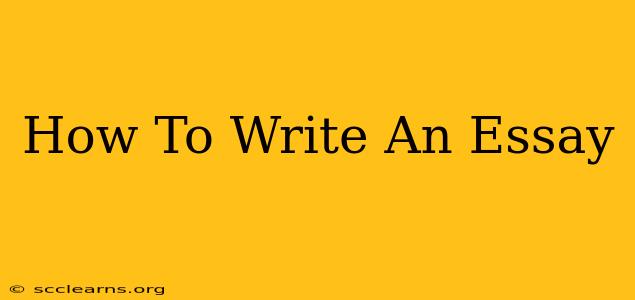Writing an essay can seem daunting, but with a structured approach and a clear understanding of the process, it becomes significantly more manageable. This guide provides a step-by-step breakdown of how to write an effective essay, from brainstorming to final polishing.
Understanding the Essay Structure
Before diving into the writing process, it's crucial to grasp the fundamental structure of an essay. A typical essay comprises three main parts:
1. Introduction: Hooking Your Reader
The introduction serves as the gateway to your essay. Its primary purpose is to grab the reader's attention and clearly state your essay's central argument or thesis statement. A strong introduction usually includes:
- Hook: Begin with a captivating sentence – a thought-provoking question, a surprising statistic, or a relevant anecdote. This immediately draws the reader in.
- Background Information: Provide context to your topic, offering necessary information for understanding your argument.
- Thesis Statement: This is the heart of your introduction. It clearly and concisely states the main point you'll be arguing in your essay. It should be specific, arguable, and provide a roadmap for the rest of your essay.
2. Body Paragraphs: Supporting Your Argument
This section forms the core of your essay. Each body paragraph should focus on a single supporting point that directly relates to your thesis statement. A well-structured body paragraph typically follows this format:
- Topic Sentence: This sentence introduces the main idea of the paragraph and directly supports your thesis.
- Evidence: Provide supporting evidence, such as examples, statistics, quotes, or anecdotes. Ensure your evidence is credible and relevant.
- Analysis: Explain how your evidence supports your topic sentence and your overall thesis. Don't just present the evidence; analyze its significance.
- Transition: A smooth transition sentence links the current paragraph to the next, creating a cohesive flow.
3. Conclusion: Summarizing and Leaving a Lasting Impression
The conclusion effectively wraps up your essay. It shouldn't introduce new information but should reiterate your main points and leave the reader with a lasting impression. A strong conclusion often includes:
- Restatement of Thesis: Reiterate your thesis statement in a fresh and concise way.
- Summary of Main Points: Briefly summarize the key supporting points you discussed in your body paragraphs.
- Concluding Thought: End with a thought-provoking statement, a call to action, or a final reflection on the significance of your essay's topic.
The Essay Writing Process: A Step-by-Step Guide
1. Brainstorming and Research: Begin by brainstorming ideas related to your essay topic. Conduct thorough research to gather relevant information and support your arguments. Utilize credible sources like books, academic journals, and reputable websites.
2. Outlining Your Essay: Create a detailed outline. This will help you organize your thoughts and ensure a logical flow of ideas. Your outline should include your thesis statement, main supporting points for each body paragraph, and a plan for your conclusion.
3. Drafting Your Essay: Start writing your essay, focusing on developing each point in your outline. Don't worry about perfection at this stage; just get your ideas down on paper.
4. Revising and Editing: Once you've completed a draft, take a break before revising. Read your essay critically, checking for clarity, coherence, and logical flow. Pay attention to grammar, spelling, punctuation, and style. Consider seeking feedback from a peer or teacher.
5. Proofreading: Before submitting your essay, meticulously proofread it to catch any remaining errors. Read it aloud to identify awkward phrasing or sentences that don't flow smoothly.
Tips for Writing a Great Essay
- Choose a topic you're interested in: This will make the writing process more engaging and enjoyable.
- Develop a strong thesis statement: A clear and concise thesis statement is crucial for a focused and effective essay.
- Use strong evidence to support your arguments: Back up your claims with credible and relevant evidence.
- Write clearly and concisely: Avoid jargon and overly complex sentence structures.
- Proofread carefully: Errors in grammar and spelling can detract from the overall quality of your essay.
By following these steps and tips, you can significantly improve your essay writing skills and produce high-quality work. Remember, practice makes perfect. The more you write, the better you'll become.

